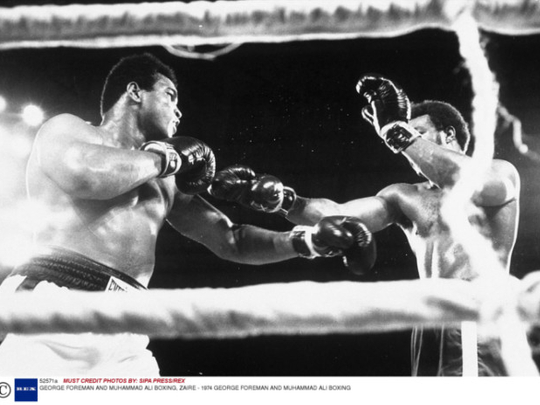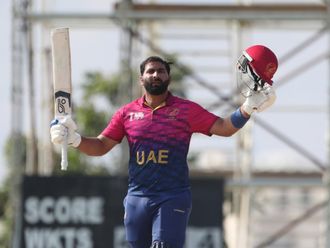
Abu Dhabi: Forty years on from the ‘Rumble in the Jungle’, and there remains a nagging and profound feeling of disbelief for George Foreman that he lost his iconic world heavyweight boxing encounter with Muhammad Ali.
Foreman was the most fearsome heavyweight boxer of the era — the then 25-year-old’s sledgehammer-like punches expected to add a 41st victim in a 32-year-old Ali to his unbeaten record, embellished by an impressive 37 knockouts.
Yet the irrepressible Ali confounded the odds — he was regarded by some bookmakers to be a 40-1 outsider to win as he was a declining force — to record a stunning eighth-round stoppage over the then reigning champion in Kinshasa, Zaire (now Democratic Republic of the Congo).
Ahead of the 40th anniversary of the fight on Thursday, Foreman told Gulf News in an exclusive telephone interview: “I’ve watched the [2001] movie ‘Ali’ and [the 1997 Oscar-winning film documentary] ‘When We Were Kings’, and I keep thinking I’m gonna win this time [laughs]. And the strange thing is I always lose.”
Memories of the historic fight — it was the first time a major sporting event had been held in Africa — and the kaleidoscope of emotions it provokes never fade for Foreman.
“Sometimes it seems such a long time ago and then all of a sudden one night, all the memories flood again as though it was yesterday,” the 65-year-old said, exhilaration and pride propelling his Texan drawl.
“There’s sadness and disappointment at losing, but then I think about how close Muhammad Ali and his children and I are. And how Muhammad Ali and I have become so close over the years, and I feel such joy because it [the fight] bound us.”
It’s been labelled arguably one of the greatest sporting events of the 20th century, a David and Goliath-esque triumph for the underdog in Ali against his younger and stronger opponent in Foreman.
But the ‘Rumble in the Jungle’ was also a seminal occasion which transcended sport; here were two black Americans fighting in Africa, which came at the height of the Black Power movement in the United States.
Summing up the fight’s significance, Foreman said: “I overpowered Ali in the first few rounds, but for some reason he stayed the course. He survived and he was able to get a victory and it was all based on his skill and experience. It’s just something you won’t see a lot.”
“It was a preview for many of the world events and cups going on now,” added Foreman. “The world did not exist until that fight.”
Foreman recalls unalloyed ‘happiness’ from the people of Africa, awestruck by the prospect of two sporting superstars gracing their continent.
Equal respect
While many fans voiced their appreciation for the revered Ali, shouting ‘Ali, boma ye!’ (Ali, kill him!), Foreman insists they afforded him equal respect.
“The people in Africa could not believe that such a world event was taking place in their country,” he said. “They treated us so fine and took good care of me.”
It’s a surprise to learn from Foreman that the two fighters did not actually meet to publicise the fight and only saw each other as they entered the ring.
Without national television in Africa, Foreman therefore did not hear Ali employing his customary mind games by characterising his opponent as ‘The Mummy’, a slow and lumbering lump of a man, with no talent apart from his prodigious punching power.
Foreman had suffered setbacks in training — a cut to the eye during sparring forcing the postponement of the fight from September 25 to October 30 — and a suspicion that his water had been doped somehow.
Yet he remained the overwhelming favourite to beat Ali due to his size, power and dominance of the heavyweight division.
Both men were 6ft 3ins, but Foreman was the more heavily muscled of the two, and the reigning world heavyweight champion.
The 1968 Olympic gold medallist was considered invincible, having annihilated the only two men to have beaten Ali, Joe Frazier and Ken Norton, both inside two rounds.
As the legendary Scottish sports writer, Hugh McIlvanney, noted at the time: “There seems only one way to beat George Foreman: Shell him for three days and then send the infantry in.”
But just how powerful was Foreman in his eyes?
Hard puncher
Could he have beaten Mike Tyson, widely considered to have been the most savage puncher ever in the heavyweight division, at their respective peaks?
“I was as hard a puncher and I was bigger [than him],” Foreman replies emphatically. “At my peak and his peak, nah, he couldn’t have withstood me then. I was wild and fast.”
He was therefore brimming with confidence ahead of his showdown with Ali, saying: “I figured that if I didn’t knock him out in the second round, it was because I’d knocked him out in the first round. My only thought was I’m going to knock him out no matter which round.
“I was that confident. No one even mentioned to me that no one had knocked him out beforehand.”
Yet Foreman’s animalistic lust for a thunderous finish would prove his undoing, as his relentless barrage of punches and stalking of the elusive Ali crucially sapped his energy.
He said: “About the end of the third round, I started losing all of my energy, and that was the scary thing, because I didn’t know how to run, nor was I willing to back up or cover up.
“And I had to keep fighting, although I didn’t have any energy.”
Years later, regrets continue to gnaw at Foreman’s mind as he questions why he did not alter his tactics.
He said: “I think: ‘Why didn’t you just box?’ Use the pivot and let him come to get you’. And it always comes back to my mind every three years: ’Why didn’t you such and such? Why didn’t you such and such?’”.
Nevertheless, despite being forever dogged by self-reproach, Foreman acknowledges that the ‘genius’ of Ali had helped engineer his downfall.
He said: “Part of the charm and brilliance and the genius of Ali was to make you keep coming. His genius made me continue to swing although I was burnt out.
“The man was very smart.”
Ali’s preternatural durability also astonished Foreman, who says his opponent refused to buckle, despite “taking some of the best shots I’d ever landed on anyone”.
“That’s the most amazing thing I’ve ever seen in my life,” said Foreman. “The only time I didn’t knock someone out was because I didn’t catch them with a shot. I’ve never encountered that will in a human being.”
Frightening
Employing his famed ‘rope-a-dope’ tactics — whereby he would soak up Foreman’s pressure and take a breather on the ropes as the younger man tired — was not the only wily machination Ali had up his sleeve.
Foreman recalled: “One time I hit him really hard in the side. And he held me and said: ‘Is that all you got George?’. I can remember it just like it was yesterday.
“That was frightening. I hurt him and I knew he was hurting. But yet he continued to say things.”
Ali might have wounded him with a killer taunt, but his punches did not hurt him, Foreman insisted.
Yet in the eighth round, Ali’s blurring hand speed brought the fight to a sudden and unexpected conclusion.
“He never hurt me, that’s why I continued following him around,” said Foreman. “Then I missed him and turned away from the ropes and then he produced a one-two combination and the quickest right hand I’ve ever seen. It was so fast. Pow! And it knocked me down and I tried to catch my balance because it wasn’t that hard.”
The referee, Zach Clayton, would stop the fight with two seconds remaining of the round, despite Foreman getting up at the count of nine. A shattered Foreman did not fight again for 15 months as he recovered psychologically from having his aura of invincibility obliterated by Ali’s grievous blow.
The mental scars remain for Foreman, who insists he could have won every round of the fight if he had boxed more cleverly.
“I could have won the fight by points but I wanted to knock him out,” he said. “And I regret it, having that kind of attitude way back when I was young. I didn’t want to win on points, I wanted a knockout. If it killed me, I wanted to knock everybody out.
“I vowed never again would I go out and try and knock someone out in the first or second round. If they wanted to box for 10 rounds, I’d get them in 10.”
However, even with a different approach, Foreman is unsure if he would have beaten the more experienced and skilled Ali.
He said: “The man had my number as he could take the pain and continue. I think if we’d fought twice, he’d have beaten me twice.
“All I wanted to knock him out but he didn’t care about knocking me out. I think he was as shocked as I was that I went down. He was just trying to get out of my way.”
No rematch
Foreman demanded a rematch, which never materialised.
Is he disappointed he never got the chance of revenge?
He said: “Yeah, I called for the rematch. But you’re in the ring beating a guy and all of a sudden about the sixth or seventh round he starts screaming ‘Is that all you got?’. You think I was on my knees praying for a rematch? No way.”
While many emotions continue to swirl in Foreman’s mind about the fight, the most dominant one is overwhelming pride at being part of one of the finest pieces of sporting theatre ever.
“It was a gift to the world as a boxing match,” he said. “What made it more fitting was that Muhammad Ali did win the fight. And not many expected that to happen.”
On Thursday, Foreman hopes to speak to Ali to renew their ‘close’ friendship.
“We’re about the two closest people in boxing alive today,” he said. “We had a great boxing match but our friendship has been even better.”
If he is unable to contact his old foe, he will stride down a well-trodden memory lane and again fool himself into thinking he will win the fight — before a brutal reality check hits him as fiercely as one of his thudding punches.
He said: “I’ll probably go to someone’s house and watch [a replay of] the boxing match. I’ll watch it until the eighth round and then say ‘Let’s cut it off’.”











